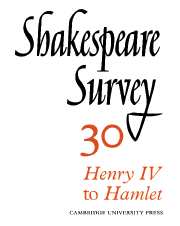Book contents
- Frontmatter
- ‘Henry IV’ and ‘Hamlet’
- Prince Hal and Tragic Style
- The True Prince and the False Thief: Prince Hal and the Shift of Identity
- Falstaff, the Prince, and the Pattern of ‘2 Henry IV’
- Whatever Happened to Prince Hal?: An Essay on ‘Henry V’
- ‘Henry V’ and the Bees’ Commonwealth
- ‘All’s Well that Ends Well’
- ‘Hamlet’ and the Power of Words
- Hamlet the Bonesetter
- ‘Hamlet’: A Time to Die
- Shakespeare, Lyly and Ovid: The Influence of ‘Gallathea’ on ‘A Midsummer Night’s Dream’
- Making a Scene: Language and Gesture in ‘Coriolanus’
- Freedom and Loss in ‘The Tempest’
- Inigo Jones at The Cockpit
- Theory and Practice: Stratford 1976
- The Year's Contributions to Shakespearian Study 1 Critical Studies
- 2 Shakespeare’s Life, Times, and Stage
- 3 Textual Studies
- Index
- Plate Section
Shakespeare, Lyly and Ovid: The Influence of ‘Gallathea’ on ‘A Midsummer Night’s Dream’
Published online by Cambridge University Press: 28 March 2007
- Frontmatter
- ‘Henry IV’ and ‘Hamlet’
- Prince Hal and Tragic Style
- The True Prince and the False Thief: Prince Hal and the Shift of Identity
- Falstaff, the Prince, and the Pattern of ‘2 Henry IV’
- Whatever Happened to Prince Hal?: An Essay on ‘Henry V’
- ‘Henry V’ and the Bees’ Commonwealth
- ‘All’s Well that Ends Well’
- ‘Hamlet’ and the Power of Words
- Hamlet the Bonesetter
- ‘Hamlet’: A Time to Die
- Shakespeare, Lyly and Ovid: The Influence of ‘Gallathea’ on ‘A Midsummer Night’s Dream’
- Making a Scene: Language and Gesture in ‘Coriolanus’
- Freedom and Loss in ‘The Tempest’
- Inigo Jones at The Cockpit
- Theory and Practice: Stratford 1976
- The Year's Contributions to Shakespearian Study 1 Critical Studies
- 2 Shakespeare’s Life, Times, and Stage
- 3 Textual Studies
- Index
- Plate Section
Summary
In the words of Anne Barton ‘although there is no identifiable narrative or dramatic source for the plot, a good deal of general reading seems to underlie’ A Midsummer Night’s Dream. The nature and extent of that reading has been amply illustrated by previous commentators whose conclusions have almost invariably contained some reference to the influence exerted by Lyly on Shakespeare at this stage of the dramatist’s career. Marco Mincoff, for example, maintains that ‘with A Midsummer Night’s Dream comes a new advance’ towards the work of a largely uncongenial predecessor, while Anne Barton suggests that Shakespeare’s young lovers ‘would probably have reminded many members of Shakespeare’s audience of equivalent characters’ in Lyly’s plays. Conversely, writers on Lyly have sought to show the relationship between the first major exponent of the comic form in England and his more illustrious successor, and it is in this area that the most detailed and persuasive analyses may be found. As early as 1902 R. Warwick Bond cited some interesting parallels between Shakespeare’s play and Lyly’s Midas, Endimion and The Woman in the Moon while, more recently, G. K. Hunter has argued that both Love’s Labour’s Lost and A Midsummer Night’s Dream are ‘completely Lylian in their construction’, pointing, in the case of the latter play, to the ‘balancing [of] a number of self-contained groups, one against the other’, to the introduction of successive groups of characters, each entry expounding ‘what is to be its intention and outlook for the rest of the play’ and to the ‘clearly exposed debate subject of . . . imagination versus reason’.
- Type
- Chapter
- Information
- Shakespeare Survey , pp. 125 - 134Publisher: Cambridge University PressPrint publication year: 1977
- 2
- Cited by



